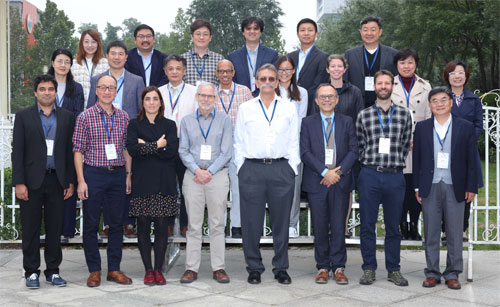Round Table – 3D Printing in healthcare
On Thrusday 31st we will have the opportunity to learn from the Prof. Axel Guenther (University of Toronto) and from Dr. Tamer Mohamed (Aspect Biosystems Ltd.), the latest results obtained … Read more
On Thrusday 31st we will have the opportunity to learn from the Prof. Axel Guenther (University of Toronto) and from Dr. Tamer Mohamed (Aspect Biosystems Ltd.), the latest results obtained … Read more
L’IBEC participa a la 13a Festa de la Ciència Durant tot un cap de setmana, el 26 i 27 d’octubre, el Moll de la Fusta acull la tretzena edició de la … Read more
L’IBEC participa a la 13a Festa de la Ciència Durant tot un cap de setmana, el 26 i 27 d’octubre, el Moll de la Fusta acull la tretzena edició de la … Read more
L’IBEC participa a la 13a Festa de la Ciència Durant tot un cap de setmana, el 26 i 27 d’octubre, el Moll de la Fusta acull la tretzena edició de la … Read more
L’IBEC participa a la 13a Festa de la Ciència Durant tot un cap de setmana, el 26 i 27 d’octubre, el Moll de la Fusta acull la tretzena edició de la … Read more
Open Access and the Future of Scholarly Publishing Clàudia Aunós – MDPI During this Open Access week, we will take the opportunity to talk and discuss about what Open Access … Read more
Open Access and the Future of Scholarly Publishing Clàudia Aunós – MDPI During this Open Access week, we will take the opportunity to talk and discuss about what Open Access … Read more
Open Access and the Future of Scholarly Publishing Clàudia Aunós – MDPI During this Open Access week, we will take the opportunity to talk and discuss about what Open Access … Read more
Open Access and the Future of Scholarly Publishing Clàudia Aunós – MDPI During this Open Access week, we will take the opportunity to talk and discuss about what Open Access … Read more
 Last 9-11th of October took place in Beijing the workshop on “Engineering and Manufacture of Living Systems”. The aim of the workshop was to bring together multi-disciplinary researchers to review the latest advances and discuss the future directions in the design and manufacture of engineered living systems, and their integration amongst the researchers gathered at this international workshop.
Last 9-11th of October took place in Beijing the workshop on “Engineering and Manufacture of Living Systems”. The aim of the workshop was to bring together multi-disciplinary researchers to review the latest advances and discuss the future directions in the design and manufacture of engineered living systems, and their integration amongst the researchers gathered at this international workshop. The major topics discussed during the workshop were: to consider issues related to translation of engineered living systems from the laboratory to the clinic and to industry, review enabling and emerging techniques for using pluripotent cells from various sources such as cell spheroids, organoids and organs-on-a-chip, discuss the ethical, societal and regulatory issues associated with the development and manufacture of engineered living systems and envision future research, development and synergies at the integration and interface of biomanufacturing and engineering living systems amongst others. The meeting was organised by Tsinghua University and the Massachusetts Institute of Technology.